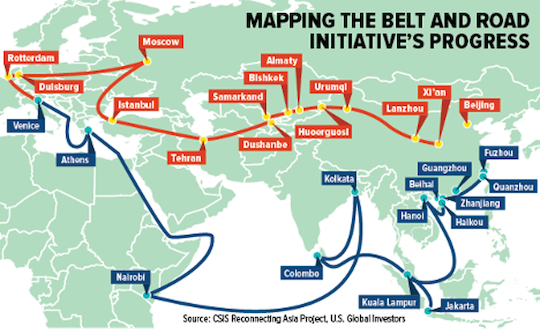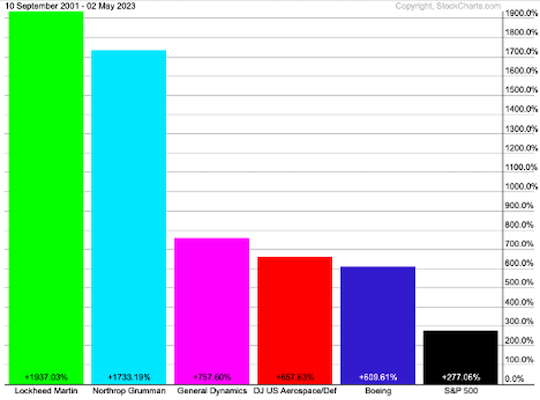America Can’t Be the Peace Broker
- Saudi Arabia and Iran have normalized diplomatic relations.
- Syria may now be readmitted to the Arab League.
- Boy, those Chinese diplomats have done a bang-up job!
Good morning from Northern Italy, where it’s all play and no work.
This week is the local holiday of Festa di San Secondo, which celebrates our patron saint.
San Secondo was a 2nd-century Christian martyr who was beheaded under the Roman emperor Hadrian for refusing to abandon his faith.
We’ve eaten, drunk and been merry from last Friday night to yesterday. Luckily, the town has opened today, so I can drink my favorite Lavazza Reserva di Tierra from my friend Fabrizio’s café.
While we’ve kept to ourselves here in Il Piemonte, peace seems to be breaking out in the Middle East, heaven forfend!
Saudi Arabia and Iran kiss and make up?
Syria may be readmitted to the Arab League?
What new devilry is this?
The romantic in me would like to think the CIA has taken a permanent vacation. But the realist in me knows Chinese diplomats have done yeoman’s work in a region the USG has all but abandoned as a partner.
In fact, the U.S. is now a strategic competitor to Saudi Arabia, thanks to its shale industry. And that’s put Russia and China in the driver’s seat.
After their tiff drove oil negative in 2020, Saudi will never mess with the Russians again. And China buys more oil from Saudi Arabia than anyone else. That’s right; the petrodollar is already on life support.
The truth is, Saudi Arabia doesn’t need America anymore. Chinese purchases easily replaced Uncle Sam’s old haul. And the plus in OPEC+ is Russia, thanks to Saudi insistence.
That all makes sense, no matter how shocking it is.
But what’s truly astounding is how Iran has worked its way back into the fold without an American diplomat within 10,000 km. And Europe? It’s an afterthought.
The Chinese government richly deserves credit for bringing Saudi Arabia and Iran together. Of course, they didn’t do it for the good of humanity. And quite frankly, who cares?
No, they want that New Silk Road built. And for it to work, they need Iran in the game.

Credit:U.S. Global Investors
Now that Iran is onside, it seems the Arab League will let Syria back in.
The Arab League is a regional organization of Arab countries in and around North Africa and the Middle East. It was established in 1945 to promote economic, cultural, and political cooperation among its member states. As of 2023, the Arab League has 22 members.
Syria was suspended from the Arab League in November 2011 in response to its government’s violent crackdown on anti-government protests that had erupted earlier that year.
Forgiveness for Syria? Or taking advantage of having a dribbling dementia patient in the Oval Office?
The United Arab Emirates (UAE) may have even achieved peace with Iran before too long. And this would affect what’s happening in Yemen.
Wow, maybe they all don’t hate each other over there.
Because of all this progress, China has been called a fair and impartial mediator. This isn’t merely stepping on America’s toes. It’s slipping into its shoes and doing a better job!
I asked myself, “Why hasn’t America done a better job over there?” And I came up with three answers.
1. America’s Various Diasporas Prevent It
The USG can’t possibly do a good job when hyphenated Americans always go to bat for their ancestral homelands.
Can you imagine the Jewish-American lobby allowing the USG to sanction Israel?
Of course not.
Same as Italian-Americans vis-à-vis Italy, Indian-Americans with respect to India, and so on. The USG can never be fair and impartial.
To throw this point into sharp relief, let me tell you a story about how a group of hyphenated Americans inadvertently brought a new financial instrument into being in the 1950s.
In 1954, the USG established the “Food for Peace” program to provide surplus agricultural commodities to countries in need, including the Soviet Union.
According to the United States Department of Agriculture, between 1954 and 1960, the Soviet Union received 4.1 million metric tons of food under the program. This included wheat, corn, soybeans, and other commodities.
However, following the Soviet invasion of Hungary in November 1956, the US government suspended the “Food for Peace” program to the Soviet Union. The USG decided in response to widespread public outrage over the Soviet action in Hungary and concerns about Soviet aggression more broadly.
In short, Hungarian-Americans, along with a bunch of other do-gooders, made the USG stop sending food to starving Russians. Clearly, the Hungarian-Yanks didn’t turn the other cheek.
Besides depriving the Soviet Union of food, the Soviets were worried that the US would freeze its assets held in American banks. (Sound familiar?)
The question was, “How do you keep your USD without having it confiscated?”
Luckily for the Russians, they owned a British-chartered bank called the Moscow Narodny Bank.
The bank was founded in 1918 by Russian émigrés, and by the 1950s, it had become a major player in the London banking scene.
One of its key figures was a banker named Andrei Kosygin. Kosygin was a Soviet who had been sent to London in the early 1950s to manage Soviet assets held in British banks.
The MNB worked with Kosygin to create a system for holding Soviet assets in U.S. dollars outside the United States, primarily in London.
Et voila!
Now you have Eurodollars, which are USD held outside the USA. And since they’re outside the USA, they’re not subject to U.S. banking regulations and reserve requirements.
Checkmate.
Whenever someone says nothing can replace the USD as the world’s reserve currency, I think about how Hungarian-Americans inadvertently forced the Soviets to invent Eurodollars.
“Nothing” just hasn’t been invented yet.
2. The Military-Industrial Complex Doesn’t Want Peace
If you tell me nonsense like “peace requires strength,” I’ll laugh at you.
Not because it isn’t true. But because of context.
In matters of defense, strength certainly matters.
But the USG has specialized in offense since the USS Arizona sank. (My great uncle was there and lived. Unfortunately, but understandably, he refused to talk about it.)
I won’t belabor this section with anything other than a chart that says it all.

Since September 10, 2001, LMT is up 1,937.03%, NOC is up 1,733.19%, GD is up 757.60%, the Dow Jones US Aerospace/Defense Sector is up 657.63%, and Boeing is up 609.61%.
The SPX pales in comparison, only up 277.06% over the same period.
Marine Corps Major General Smedley Butler was correct when he wrote War is a Racket. But that racket makes some people very rich. And they usually have ties to Washington.
In this sense, “America” isn’t one unit. Neocons and defense companies always want war because they profit by it.
3. The “Stick” Isn’t as Big as It Used to Be, and America Doesn’t Do Carrots
The rest of the world is getting together under Chinese and Russian leadership to escape Dollar World. Many influential economists think this is impossible.
But the difference this time is that the move isn’t organic or passive. The BRICS and the Global South are actively looking for alternatives.
It’s the same spirit that created the Eurodollar.
Just because we can’t see what that alternative will be doesn’t mean it won’t come into being.
Most other countries know America can’t stomach a full-blown war. If it could, US troops would’ve been in Ukraine months ago. (Ok, but not clandestinely.)
Not only that, but America can’t fight on two fronts anymore. It simply doesn’t have the same industrial capacity it used to have.
So the world has become bolder and more brazen.
It’s not nearly as afraid as it used to be.
And what’s worse, when America comes up with a benign idea, most countries simply don’t believe it.
America always has an ulterior motive.
So a Russian/Chinese alternative is an excellent bet for these nations.
Wrap Up
China’s diplomats have embarrassed Foggy Bottom. Peace broke out in the Middle East, and America was caught on the back foot.
But can America act as an impartial peace broker anyway?
I don’t think so. Though the U.S. is technically at peace now, it’s been at war for 226 out of 246 years.
Twenty years of peace. Ever.
There are too many factions inside the U.S. for “America” to act as one unit. And the warmongering factions are happy to send someone else’s sons to fight their war for them.
Someone is always ready for battle, whether it’s defense contractors, neocons, or diasporas.
So it’s no surprise that the U.S. isn’t viewed as a peace broker. Nor is it a surprise that it’s considered a warmonger.
Have a lovely weekend!
If this is the sort of thing you’d like to see more of, please let me know here. Or if you have any suggestions for future topics, do let me know that as well.


Comments: